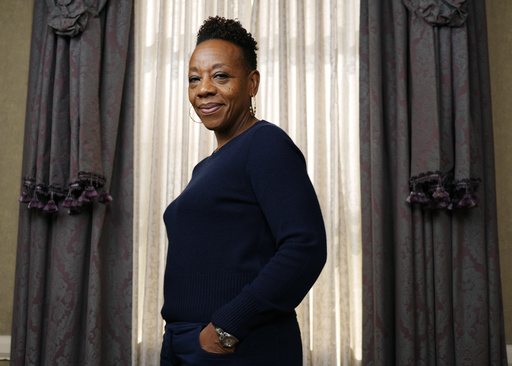
Of all the character roles portrayed in films this year, Marianne Jean-Baptiste’s Pansy stands out in exceptional ways in Mike Leigh’s latest work, “Hard Truths.”
Pansy, a middle-aged resident of London, exudes anger and bitterness throughout the film. She navigates through life with visible emotional and physical distress, often taking it out on her loved ones, including her husband, Curtley (played by David Webber), and her young adult son, Moses (Tuwaine Barrett). Her ire is directed at everyone she crosses paths with, whether it’s a cashier at the grocery store or a couple casually trying out furniture. The slightest incident, like someone occupying her coveted parking space, could provoke her wrath.
For everyone involved in her life, Pansy poses a challenge. She pushes her family’s limits of understanding and tolerance, echoing a similar test for the audience. Unlike traditional antiheroes, she embodies a stark opposition to nearly everything.
“There are numerous people like Pansy in the world who struggle with the burdens of others,” Jean-Baptiste notes. “I’ve encountered individuals who become enraged over trivial matters because they feel unseen. It highlights that the situation is often not only about themselves but involves complex backgrounds we may not understand.”
“Hard Truths,” scheduled for national release on January 10, offers no straightforward explanations. Instead, it evolves into an in-depth character analysis, heavily carried by the remarkably complex portrayal of Pansy by Jean-Baptiste. This film has garnered her some of the most favorable reviews she has received since collaborating with Leigh nearly three decades ago on “Secrets & Lies.” In that film, she made history as the first Black British actress nominated for an Academy Award. Her current performance has attracted considerable acclaim, with notable organizations honoring her as the best actress, setting the stage for a potential Oscars return.
Reflecting on their collaboration, Leigh observes, “When you reunite with Marianne, it’s like a reunion over the years. She brings in a rich sense of humor, which makes our discussions engaging and opens a world of possibilities in storytelling.”
Working with Leigh, recognized for his humanistic storytelling in films like “Naked” and “Vera Drake,” is a unique experience lacking a conventional script. The process typically begins with a simple proposition. “It was the standard: Let’s create a film together,” shares Jean-Baptiste. “Truthfully, we started with no specific direction but decided to embark on this creative journey.”
Leigh’s method involves developing characters and plots over extended rehearsal periods—in this instance, a three-month timeframe, which is considered brief by his standards yet notably longer than typical industry practices today.
“Normally, you arrive on set, and it’s just introductions: ‘Meet Ralph; he’ll play your husband… stand here,’” says Jean-Baptiste. “However, Leigh’s approach focuses on forming a character’s earliest memories and constructing their life trajectory leading up to the film’s timeline. This method requires continuous reevaluation of the characters’ experiences, while design teams eagerly await a decisions for appropriate costumes and settings.”
According to Jean-Baptiste, “Actors are empowered to make key decisions regarding their characters’ lives, while larger life circumstances are often outside their control. For instance, if she applies for a job, and receives a rejection letter, that’s part of her reality.”
Having transitioned to film after a classical theatre education, Jean-Baptiste found success in “Secrets & Lies” in 1996, a breakthrough role that established her career. She later moved to Los Angeles and participated in a variety of projects including popular TV series. Reflecting on her dynamic with Leigh from their earlier collaboration, she observes that some aspects remain unchanged despite the years passing. “We’ve both grown older,” she laughs. “But there was a seamless transition back into working together. He was surprisingly gentler.”
Jean-Baptiste’s portrayal diverges sharply from her character, Pansy. The actress is lively, frequently laughing, and takes pleasure in embracing uncertainty. When questioned about any similarities to Pansy, she lightheartedly states, “I truly hope not.” She continues, “Pansy lacks the sense of humor I possess, despite her own darkly comic elements. I recognize a part of myself in her struggles and actively choose a different path for my life.”
Nonetheless, she relates to Pansy by identifying elements of familiar personalities and addressing the rarely seen depiction of challenging characters. “Such a complex Black woman is rarely portrayed on screen,” she admits. “In fact, I can hardly recall witnessing it.”
While the specifics of Pansy’s melancholic state remain vague, the film poignantly conveys her unresolved emotional traumas. During a visit to her doctor, she articulates, “The core issue lies within my mind.” When pressed about her inability to find joy, she simply replies, “I don’t know.” Jean-Baptiste posits her own theories: “Pansy has faced unresolved issues her entire life, developing coping mechanisms to endure. Many individuals may remain undiagnosed and find ways to manage their pain—Pansy may be one of those.”
“She is driven by fear,” she explains. “Pansy tends to strike out before feeling vulnerable, constantly perceiving the world as hostile toward her.”
Ultimately, “Hard Truths” doesn’t center around Pansy’s diagnosis but rather focuses on how her family and society respond to her turmoil. Despite her tendency to push people away, it becomes apparent that she yearns for support. “I hope someone lends a hand to Pansy,” Jean-Baptiste expresses. “Labeling her condition as a mental illness might be easy, but the more compelling aspect is the ambiguity of her pain.”
The narrative reaches a point of uncertainty, leaving Pansy and her family in a state of immobility. As Pansy challenges the audience’s perception of empathy, a pivotal question arises: Will she seek solace from her husband, or staunchly remain in her stubbornness? Jean-Baptiste expresses optimism for her character. “I believe she will reach out because I genuinely care for her,” she concludes. “I have an affinity for Pansy, and I want to ensure her wellbeing.”

